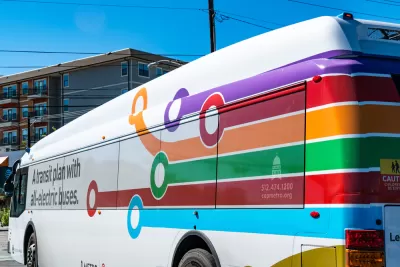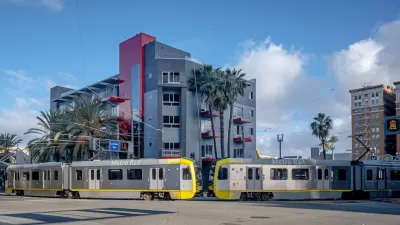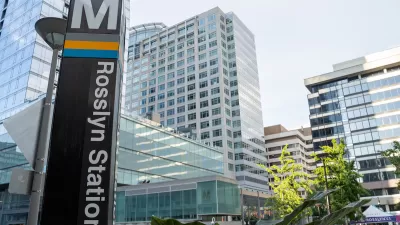City officials are deciding how to change parking requirements for transit-oriented developments that are meant to discourage private car ownership.

As the city of Austin finalizes its equitable transit-oriented development (eTOD) plan, some officials are urging their peers to change parking requirements near transit stations, reports Jonathan Lee in the Austin Monitor.
João Paulo Connolly, a member of the Project Connect Community Advisory Committee, “said that eliminating parking minimums is ‘an absolute baseline must,’” urging the city council to also adopt maximum parking requirements. “By making developers build as little parking as possible near transit stations, such policies would mean people are more likely to ditch their cars for trains or buses, Connolly and others argued.”
The eTOD plan proposes three ways to reform parking requirements: eliminating minimums, creating parking maximums, and including parking in floor area ratio (FAR) calculations. The change in FAR is the most controversial of the proposed changes. “According to city staffers, some stakeholders said the policy could prevent some projects from obtaining financing. In response, staffers recommend against adopting the policy.”
Other policies promoted by the eTOD plan include density bonuses, the preservation of existing affordable housing, and incentives to help small businesses open in TODs.
FULL STORY: Transit-oriented development plan prompts parking discussions

Planetizen Federal Action Tracker
A weekly monitor of how Trump’s orders and actions are impacting planners and planning in America.

Congressman Proposes Bill to Rename DC Metro “Trump Train”
The Make Autorail Great Again Act would withhold federal funding to the system until the Washington Metropolitan Area Transit Authority (WMATA), rebrands as the Washington Metropolitan Authority for Greater Access (WMAGA).

The Simple Legislative Tool Transforming Vacant Downtowns
In California, Michigan and Georgia, an easy win is bringing dollars — and delight — back to city centers.

The States Losing Rural Delivery Rooms at an Alarming Pace
In some states, as few as 9% of rural hospitals still deliver babies. As a result, rising pre-term births, no adequate pre-term care and harrowing close calls are a growing reality.

The Small South Asian Republic Going all in on EVs
Thanks to one simple policy change less than five years ago, 65% of new cars in this Himalayan country are now electric.

DC Backpedals on Bike Lane Protection, Swaps Barriers for Paint
Citing aesthetic concerns, the city is removing the concrete barriers and flexposts that once separated Arizona Avenue cyclists from motor vehicles.
Urban Design for Planners 1: Software Tools
This six-course series explores essential urban design concepts using open source software and equips planners with the tools they need to participate fully in the urban design process.
Planning for Universal Design
Learn the tools for implementing Universal Design in planning regulations.
Smith Gee Studio
City of Charlotte
City of Camden Redevelopment Agency
City of Astoria
Transportation Research & Education Center (TREC) at Portland State University
US High Speed Rail Association
City of Camden Redevelopment Agency
Municipality of Princeton (NJ)





























